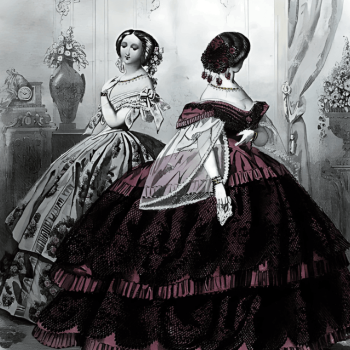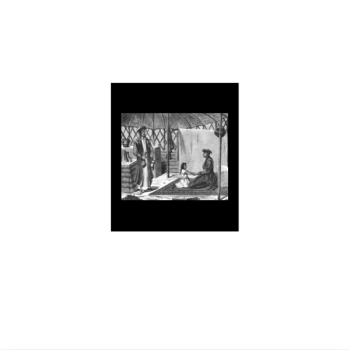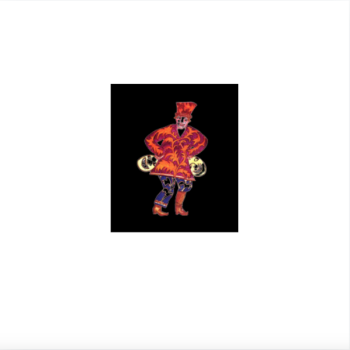LEONID
June 1840
It was midsummer and the grove had darkened. The violets, lilies, and lilacs faded. So, too, did the linden trees and multi-colored wild roses. One day after dinner, Aunt Nadya, Lelya, and Vera sat alone in the living room when they heard some kind of commotion in the house. The girls, trying not to make a sound, tip-toed out of the room, closing the doors tightly behind them. The maids were running around to all the rooms, and the servants were whispering to one another. They found Aunt Katya and Antonia, who looked concerned and answered their questions with dismissive aloofness. It seemed clear to Vera that something extraordinary was happening, which Lelya and Aunt Nadya knew about, but did not want to tell her. Vera spent the rest of the day looking in vain for Baba Lena or Nastya, but they were nowhere to be found. Dede Andrushka was away from the city, and the only people at dinner were the girls, Uncle Rostya, and, sporadically, Aunt Katya.
“Is mom sick?” asked Vera. “Oh no! Is it Butterfly? Is Baba Lena sick? They are nowhere to be found!”
“Nobody is sick,” Aunt Katya replied. “Just sit still. Better yet, come with me upstairs and sit with Miss Jeffers.”
“Sit with a boring English girl! No way!” said Lelya. “May we stay in the living room?”
“Very well.”
Vera sat on the carpet and built a house of cards.
Lelya and Aunt Nadya began a game of preference using another deck, but that did not go so well, every so often they both ran out onto the balcony overlooking the front garden, laughing, and whispering to one another. Vera’s house didn’t stick to the carpet, so she moved my household further away, onto the floor, where she finally managed to build a tall palace of several floors.
“Look! Lelya look what a house I built!” shouted Vera in delight.
Suddenly Aunt Katya entered the room, opening the door with such force, that the house of cards came tumbling down.
“Oh, nasty aunt!” screamed Vera in despair.
“What, Verochka? What did I do?”
“The whole house fell down!”
“House? What house? Oh, yes! The card house! Well, that’s okay. I’ll build you a better one later,” said Aunt Katya. “Now listen, stop crying, I want to tell you something.” Sitting down, she put Vera on her lap and took Lelya by the hand. “Children, you have a brother,” she said, smiling cheerfully. “Do you hear? A little, baby brother!”
“A brother?” shouted Lelya. “Brother! Brother! Brother!” she sang, as she hopped about the room on one leg.
“Hush! Hush!” said Aunt Katya, lowering Vera to the floor. “Don’t make such noise, Lelya!”
“Why not? Is he sleeping? Ohhh, is he sleeping?” asked Lelya.
“Is Lenochka not feeling well?” asked Aunt Nadya, afraid for her sister.
“There is no need to worry,” said Aunt Katya. “Just don’t make any noise anyway.”
“Where is this brother?” said Vera, finally coming to her senses. “Show him to me! I want to meet him!”
“Just wait, you’ll meet him soon enough.” Aunt Katya then rushed into another room to write some kind of letter.
“Well, when?” said Vera, impatiently. “I want to see him now! Lelya! Lelya! Let’s go to mom!”
“Leave me alone!” said Lelya, huddled in a corner with Aunt Nadya. “Go away!” They were heatedly whispering about something.
“Perhaps we won’t see anything from there,” said Aunt Nadya.
“Well, here’s another one I know!” said Lelya. “We’ll see everything great! Come, let’s go give it a try.”
“OK, let’s go!”
Holding hands, Lelya and Aunt Nadya slipped out the balcony door, closing it tightly behind them.
“Where are you going?” Vera yelled after them. “I want to go, too! Let me go! I’m bored alone! Open it!” Vera desperately roared, shaking the door handle up and down.
“Oh, you nasty girl!” Lelya cried, quickly opening the door. “Don’t scream! Go away, do you hear?”
“No! I want to go with you too! Where are you going?”
“Just let her come with us, Lelya,” said Aunt Nadya. “I’ll hold her.”
“How can she come with us?” said Lelya. “She’ll fall down!”
“She won’t fall off,” said Aunt Nadya, pulling Vera through the door. “Besides, if she fell, it wouldn’t matter anyway—It’s not high here.”
It was evening now, a quiet, warm, cloudy night. The air was perfumed with the fragrance of mignonette and the sweet peas that bloomed in the front garden. Bright ribbons of light from the windows fell unfurled on the ridges and bushes. Only the outer corner window of Baba Lena’s bedroom glowed dimly. Vera’s heart sank. She was both happy and scared of something. She sensed that they were about to do something special, but not exactly what that something was. She burned with curiosity and anticipation.
“Who will go first?” Lelya whispered.
“Doesn’t matter,” Aunt Nadya replied. “Do you want me to?”
“No!” said Lelya. “Better let me go ahead!”
“Okay, go!”
“Where is it?” Vera asked, completely frozen.
“Shut up!” Lelya shouted. She then approached the porch that ran along the wall. Without going down the steps, Lelya held on to the cornice and window sills four feet off the ground. Facing the wall, and carefully walking along the narrow ledge that ran around the lower floor of the house, she crept under the bedroom window, where she stopped to peer into the room.
“What? Do you see anything?” Aunt Nadya whispered to her from afar.
“Oh! I see everything! Come quickly!”
“You had better stay,” Aunt Nadya told Vera, “stay here, otherwise you’ll fall.”
“No! No. I promise I won’t fall. I want to watch too!”
Aunt Nadya followed Lelya along the ledge, and Vera followed her step by step.
Lelya and Aunt Nadya were whispering again.
“Do you see white there on the sofa!? Do you see?”
“Yes, it was just two pillows that someone put there.”
“Where?” said Vera. “Show him to me!”
“Simpleton! Look between the pillows. Do you see him, now? Baba Lena just put him there.”
Suddenly there was a movement in the room, and everything became brighter, except for the bed on which Helena Andreevna was lying. A hand in a white sleeve rose above the pillows, slowly shaking a finger at them.
“Ay!” Lelya suddenly screamed. “Mama is threatening us!”
At the same moment, Aunt Katya quickly went to the window, peering into the faces of the girls. Her black eyebrows were furrowed, but she was smiling. After threatening them, she went to the door.
“Let’s run away!” screamed Lelya, jumping into the bushes. Aunt Nadya followed her, Vera did not know which of them pushed her, but she fell off the ledge and rolled into the grass. She was frightened by the fall, but even more frightened by Aunt Katya’s angry voice from the balcony.
“Come here, minx! Your mom told me to pull your ears and send you to Miss Jeffers!”
“Ayyeee!”
Aunt Katya captured Lelya.
Vera jumped up, as if someone was chasing her, and slipped through the gate of the front garden, and jumped into a shallow, dry groove, where she huddled under a bridge. She had not been lying there for even a minute when she heard the sound of wheels nearby. She suddenly remembered that everyone who drove through the gate had to drive across this bridge.
Vera instantly imagined that the bridge would certainly collapse, and the carriage and horses would run over her. She wanted to scream. She wanted to jump out and run away. Before she had time to do either, she heard a deafening stomp, knock, and thunder. Dust and debris fell on her through the cracks, and Dede Andrushka drove safely to the porch of the dacha. If she had managed to fulfill either intention, the horses might have gotten spooked, and Heaven knows what misfortune would have happened because of her foolishness. She crawled out from under the ditch bridge, coughing from the dust, and quietly wandered into the house, pale, and dirty. In the general mayhem, no one noticed she was missing. It was only Antonia, undressing Vera after tea was surprised by Vera’s pitiful condition.
“Verochka, how did you get so dirty?”
Vera, afraid to tell her what she had done, kept her whereabouts a secret, and for many years no one knew where she went missing on the night that her brother Leonid was born.
The last month at the dacha the grove had changed a lot. It was thinner, deserted, and boring. Yellow leaves rustled underfoot, and the wind howled in the trees. But it was beautiful. Those especially sunny days when the bright clusters of viburnum and rowan peeked out from behind the ruins of summer greenery. Soon the rains began to fall, and gray, stormy days, were common. It would soon be “rasputitsa,” that is, the “season of the bad roads.” The birth of Leonid had weakened Helena Andreevna, who contracted pneumonia soon after the baby was born.[1] She was recovering poorly from her illness, but not letting on for the sake of the children, she lit the stove and called the girls to watch their brother being bathed. Olga (Leonid’s tall nurse with a funny, rustic accent,) removed the diaper from the tiny, red baby. The girls were nervous, he was so delicate and they were certain that Olga would accidentally drown him.
Soon they moved back to the city, back to their big house on the boulevard. That autumn was marked by an emphasis on the girls’ education. Antonia and Miss Jeffers moved from visual learning to an English primer. Until that time the girls were only taught conversation and learning words, but it was now time for grammar and literacy. Miss Jeffers, in her very original way, would sit next to them, and begin by distorting her already slanted eyes even more (one of which was brown and the other green.) She would point her finger at various objects and exclaim in a sing-song voice: “Book…, Flower…, Chair…, Table…and so on until she had gone through everything that was in the room, forcing them to repeat the words after her. Miss Jeffers’ long, ugly figure and measured, mournful exclamations were so comical to the children, that it took great effort for the girls not to laugh. Nevertheless, “Miss,” as everyone in the house called Miss Jeffers, ensured that the sisters spoke fluent English in less than two years.[2]
Lelya possessed the character (good and bad) of an energetic boy. She never conformed to fixed hours for lessons, she loved travels and adventures and cared little for remonstrances. This, naturally, exhausted the patience of her teachers. Nevertheless, she excelled in her studies, and her teachers were astonished by her brilliance, particularly the ease with which she mastered foreign languages, and her exceptional musical talent.[3] She also had another talent, one which made her many enemies. She was a good caricaturist. With a few touches of her pencil, she could produce a picture so like, yet so unlike, her subject, that she was hated for evermore by the victim.[4]
-
- MOTHERS & DAUGHTERS
- A LANTERN
- CHRISTENING OF THE DOLL
- DASHA & DUNYA
- GRUNYA
- NANNY NASTYA
- NANNY’S FAIRYTALE
- CONFESSION
- IN THE MONASTERY
- PREPARATIONS FOR THE HOLIDAY
- EASTER
- THE DACHA
- THE MELON POND
- MIKHAIL IVANOVICH
- THE WARLIKE PARTRIDGE
- LEONID
- NEW WINTER
- HISTORY OF BELYANKA
- THEATRES AND BALLS
- YOLKA
- REASONING
- ROAD
- CAMP
- IN NEW PLACES
- THE GRAY MONK
- VARENIKI
- THE TRIP TO DIKANKA
- WHAT HAPPENED IN THE DOLL HOUSE
- ANTONIA’S STORY
- “A WINTER EVENING”
- THE BLACK SEA
- CRIME AND PUNISHMENT
- PANIKHIDA
- PRINCE TYUMEN
SOURCES:
[1] Fadeyev, Andrei Mikhailovich. Vospominaniia: 1790-1867. Vysochaishe Utverzhd. Yuzhno-Russkago. Odessa, Ukraine. [Russian Empire.] (1897): Part I: 167.
[2] Zhelihovskaya, Vera Petrovna. How I Was Little. A. F. Devrien. St. Petersburg, Russia. (1898): 117-127.
[3] Zhelihovskaya, Vera Petrovna. “Helena Petrovna Blavatsky: Pt. I.” Lucifer. Vol. XV, No. 87 (November 15, 1894): 202-208.
[4] “Mme. Blavatsky.” The New York Tribune. (New York, New York) May 15, 1898.













